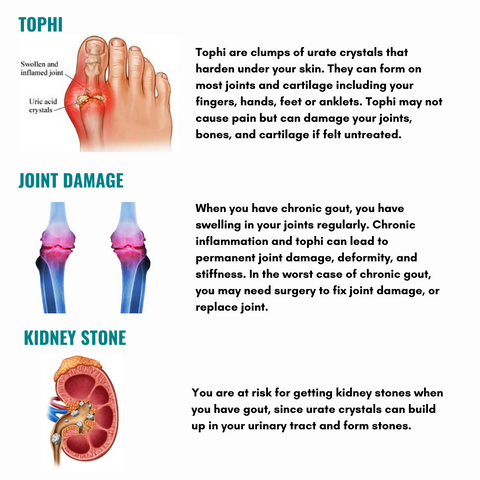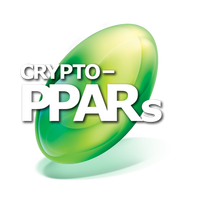PPARs and Gout
Gout is a type of inflammatory arthritis. Arthritis is a common condition that causes swelling and pain in your joints. It is considered a chronic disease and does not happen once and will usually last your whole life.

Gout usually occurs sudden with no pre-symptoms, sometimes attacks severely which called flares or flare-ups. During the gout occurrence or gout attack, it accompanied by extreme pain, swelling and redness in your joints. Gout attack often happens in the big toe but can affect any your body joints like your knees, elbow, hands or ankles. It is extremely painful and sometimes hard to control, which can be either acute or chronic.
Differences between acute gout and chronic gout
Acute Gout
- Symptoms only felt during attacks.
- Commonly 1 -3 joints are affected.
- Attacks may last for days to week.
Chronic Gout
- More than one joints is affected and will have more than 2 attacks per year.
- Chronic gout can lead to permanent joint stiffness, deformity and damage.
- Attacks usually happens with short period of time. Attacks might one after another and no breaks/symptoms in between.
Causes of Gout
Gout causes are usually due to the buildup of uric acid in your blood from the breakdown of purines. Certain conditions, such as blood and metabolism disorders or dehydration also makes our body to produce more uric acid. Diets is also associated with gout.
A kidney or thyroid problem, or an inherited disorder, can make it harder for your body to remove excess uric acid.
- Middle aged man or post-menopausal woman
- Genetics
- Eat too much purine-rich foods, such as red meats, fish, mushroom, organ meats’
- Alcohols
- Medications
- Conditions such as high blood pressure, kidney disease, thyroid disease, diabetics, or sleep apnea.
The accumulation of sodium urate crystals within joints leads to gout. The accumulations of uric acid crystals in the joints cause flare-ups and painful inflammation in and around the joints. Typical gout symptoms include intense joint pain, lingering discomfort, swelling, redness, and reduced movement. There are high chances of gout developing into other complication like hyperuricemia, hypertension, hyperlipidemia, coronary disease, diabetes, kidney stone and hardening of arteries of coronary heart disease.
GOUT COMPLICATIONS

What exactly causes high uric acid in our body?

What exactly causes high uric acid in our body?
Uric acid is a natural waste product from the digestion of foods that contain purines. Purines are found in high levels in some foods such as:
- certain meats
- sardines
- dried beans
- beer
- Alcohol
- Shellfish
- Organ meats (liver)
Purines are also formed and broken down in your body. Normally, your body filters out uric acid through your kidneys and in urine. If you consume too much purine in your diet, or if your body can’t get rid of this by-product fast enough, uric acid can build up in your blood.
Uric acid can collect in your body for many reasons. Some of these are:
- diet
- genetics
- obesity or being overweight
- stress
Besides taking in too much high purine foods, it can be also caused of excretion disorder of uric acid. Normally, uric acid passes through liver, and enters bloodstream. Most of it is excreted out of the body through urine or intestines. However, when body cannot function regularly upon excreting uric acid out the body, its results in accumulation of uric acids and leads to gout.
Treatment
Treatment for gout involves medication. Gout medications can be used to treat acute attacks and prevent future attacks. Medications can also reduce your risk of complications from gout, such as the development of tophi from urate crystals deposits.
Lifestyle and home remedies
Medications are often the most effective way to treat acute gout and can prevent recurrent attacks of gout. However, making certain lifestyle changes also are important such as:
- Limiting alcoholic beverages and drinks sweetened with fruit sugar (fructose)
- Limiting intake of foods high in purines, such as red meat, organ meat and seafood.
- Exercising regularly and losing weight. Keeping your body at a healthy weight leaves your risk of gout.
PPARs and GOUT
Peroxisome proliferator-activated receptors are a subgroup of nuclear hormone. As for Crypto PPAR, we have 3 bio-organic component known as PPAR y, PPAR B, and PPAR a.
PPARs known to be effectively treat lupus, gout and rheumatoid arthritis. Especially in reliving acute pain and inflammation.
PPARs has anti-inflammatory properties and effective in inhibiting inflammatory mediators. It works fine in relieving in gout pain and also reduces the swollen toe. The three PPARs receptors are-ligand activated transcription factors belonging to the nuclear hormone receptor superfamily.
PPAR-gamma are effective in treating inflammation. It decreases the inflammatory response of many cardiovascular cells, particularly endothelial cells. PPAR-y has been recognized as playing a fundamental important role in the immune response through its ability to inhibit the expression of inflammatory cytokines and to direct the differentiation of immune cells towards anti-inflammatory phenotypes.
There are findings highlight the genetic impact on the clinical expression of the gouty arthritis phenotype, including arthritis phenotype, including arthritis flares frequently associated with dietary excesses. The nutritional biosensor PPAR-y is a ligand-dependent nuclear receptor and transcription factor that regulates insulin sensitivity, adipocyte differentiation, and glucose homeostasis.
Reactions after consuming Crypto PPARs for Gout
1. The PPARs Gamma in Crypto PPARs aids in the reduction of gout inflammation and pain.
2. Reduction in swollen areas.
3. Might have slight pain in the beginning due to the healing crisis. The body needs to adjust along with the Crypto PPARs reaction. Body aches will start reducing, and swollen toe will reside along the way.
4. Prevent future flare-up.
Products suggested for Gout disease
ACUTE GOUT
 CHRONIC GOUT
CHRONIC GOUT

